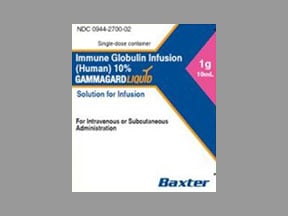
Gammagard Coupons & Savings Card – Discount Prices from $173.24
My prescription
Edit
10ML of 1GM/10ML, Gammagard (1 Vial)
Select pharmacy

Walgreens
$173.24
COUPON PRICE
Albertsons
$182.29
COUPON PRICE
Walmart
$188.74
COUPON PRICEGammagard savings card
Show this card to your pharmacist
Walgreens
$173.24
BIN
ID
PCN
GRP
019876
LH138F30EA
CHIPPO
LHX
Powered by
Price history for Gammagard
1 Vial, 10ML
Average retail price for Gammagard
Average SaveHealth price for Gammagard
Our price history data is based on aggregated prescription data collected from participating pharmacies in America. Our prescription data updates daily to reflect the latest price changes. If you notice a missing data point, it means there wasn't sufficient data available to generate a monetary value for that date.
*Retail prices are based on pharmacy claims data, and may not be accurate when we don't have enough claims.
Gammagard dosage forms
Dosage Quantity Price from Per unit 10ML 1 Vial $173.24 $173.24 10ML 2 Vials $354.49 $177.25 10ML 3 Vials $535.73 $178.58 25ML of 2.5GM/25ML 1 Vial $445.12 $445.12 25ML of 2.5GM/25ML 2 Vials $898.24 $449.12 25ML of 2.5GM/25ML 3 Vials $1351.36 $450.45 50ML of 5GM/50ML 1 Vial $898.23 $898.23 50ML of 5GM/50ML 2 Vials $1804.45 $902.23 50ML of 5GM/50ML 3 Vials $2710.46 $903.49
| Dosage | Quantity | Price from | Per unit |
|---|---|---|---|
| 10ML | 1 Vial | $173.24 | $173.24 |
| 10ML | 2 Vials | $354.49 | $177.25 |
| 10ML | 3 Vials | $535.73 | $178.58 |
| 25ML of 2.5GM/25ML | 1 Vial | $445.12 | $445.12 |
| 25ML of 2.5GM/25ML | 2 Vials | $898.24 | $449.12 |
| 25ML of 2.5GM/25ML | 3 Vials | $1351.36 | $450.45 |
| 50ML of 5GM/50ML | 1 Vial | $898.23 | $898.23 |
| 50ML of 5GM/50ML | 2 Vials | $1804.45 | $902.23 |
| 50ML of 5GM/50ML | 3 Vials | $2710.46 | $903.49 |
What is gammagard used to treat?
Gammagard is used to treat primary immunodeficiency (PI) disorders, which are conditions where the immune system does not function properly. It is also used for chronic inflammatory demyelinating polyneuropathy (CIDP), a neurological disorder. Additionally, it may be prescribed for certain other conditions as determined by a healthcare provider.
Is gammagard a chemo drug?
Gammagard is not a chemotherapy drug. It is an intravenous immunoglobulin (IVIG) used to treat patients with primary immunodeficiency disorders and other conditions that affect the immune system.
What is the difference between gammagard and IVIG?
Gammagard is a brand name for a specific formulation of intravenous immunoglobulin (IVIG). IVIG is a general term that refers to a therapy made from pooled human plasma containing immunoglobulins, primarily IgG antibodies. Gammagard is one of several brands of IVIG available, each with potentially different formulations, stabilizers, and manufacturing processes. However, they all serve the same primary purpose of providing immune support for individuals with certain immune deficiencies or autoimmune conditions.
Is gammagard expensive?
Gammagard can be considered expensive. The cost varies depending on factors such as dosage, location, and insurance coverage. Patients are advised to consult with their healthcare provider or insurance company for specific pricing information and potential financial assistance options.
Why is IVIG not covered by insurance?
Insurance coverage for Intravenous Immunoglobulin (IVIG) can vary based on several factors, including the specific insurance plan, the medical necessity of the treatment, and the condition being treated. Some insurance plans may not cover IVIG if it is not deemed medically necessary or if it is used for off-label purposes. Additionally, coverage may be limited if the treatment is considered experimental or if there are less costly alternatives available. It is important for patients to check with their insurance provider to understand the specific coverage details and any potential out-of-pocket costs.
